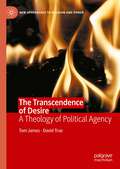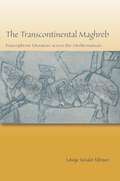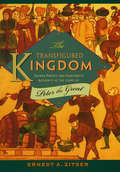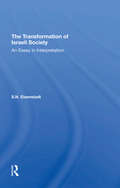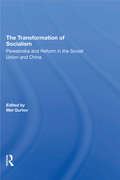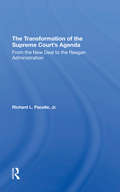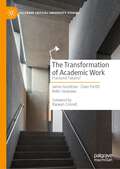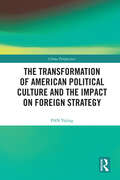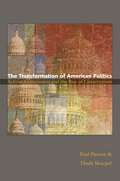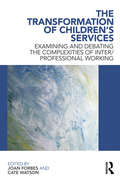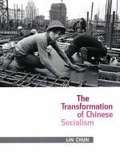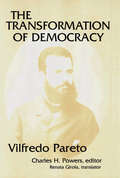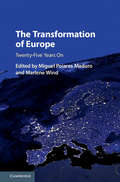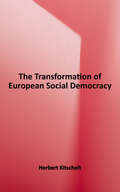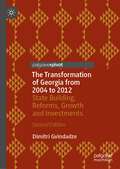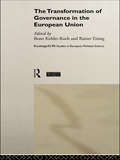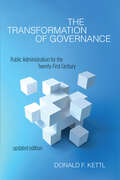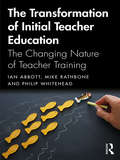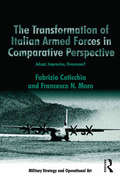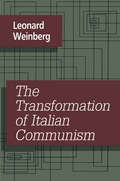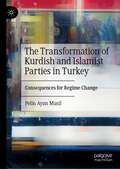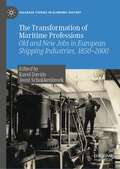- Table View
- List View
The Transcendence of Desire: A Theology of Political Agency (New Approaches to Religion and Power)
by Tom James David TrueThe “secular age” is not a smooth, untroubled process of accumulation and advance but an uneven and unpredictable series of clashes of interest. Charles Taylor’s “immanent frame” cannot be construed merely as a phenomenon within religion and culture but urgently needs to be understood in political and economic terms–i.e., as a class project. The failure of the secular, vividly displayed in the crumbling legitimacy of global institutions and in the spectacle of police violence, both calls for and makes possible a renewal of political agency. Tom James and David True argue that a theology of the cross has a distinctive potential today: it can pierce the sacred aura of normalcy around the consensual anti-politics of the neoliberal order so that a vision of a world beyond today’s racialized capitalism can emerge. But they contend that we don’t need to forsake the emancipatory aims of modernity nor retreat to local communities. As an alternative to these weak strategies, they offer a constructive and cruciform account of political agency that includes both prophetic resistance and practical wisdom, each embedded in contemporary struggles for freedom that, they argue, embody divine desire for a common world.
The Transcontinental Maghreb: Francophone Literature across the Mediterranean
by Edwige Tamalet TalbayevThe writer Gabriel Audisio once called the Mediterranean a “liquid continent.” Taking up the challenge issued by Audisio’s phrase, Edwige Tamalet Talbayev insists that we understand the region on both sides of the Mediterranean through a “transcontinental” heuristic. Rather than merely read the Maghreb in the context of its European colonizers from across the Mediterranean, Talbayev compellingly argues for a transmaritime deployment of the Maghreb across the multiple Mediterranean sites to which it has been materially and culturally bound for millennia.The Transcontinental Maghreb reveals these Mediterranean imaginaries to intersect with Maghrebi claims to an inclusive, democratic national ideal yet to be realized. Through a sustained reflection on allegory and critical melancholia, the book shows how the Mediterranean decenters postcolonial nation-building projects and mediates the nomadic subject’s reinsertion into a national collective respectful of heterogeneity. In engaging the space of the sea, the hybridity it produces, and the way it has shaped such historical dynamics as globalization, imperialism, decolonization, and nationalism, the book rethinks the very nature of postcolonial histories and identities along its shores.
The Transfigured Kingdom: Sacred Parody and Charismatic Authority at the Court of Peter the Great (Studies of the Harriman Institute)
by Ernest A. ZitserIn this richly comparative analysis of late Muscovite and early Imperial court culture, Ernest A. Zitser provides a corrective to the secular bias of the scholarly literature about the reforms of Peter the Great. Zitser demonstrates that the tsar's supposedly "secularizing" reforms rested on a fundamentally religious conception of his personal political mission. In particular, Zitser shows that the carnivalesque (and often obscene) activities of the so-called Most Comical All-Drunken Council served as a type of Baroque political sacrament—a monarchical rite of power that elevated the tsar's person above normal men, guaranteed his prerogative over church affairs, and bound the participants into a community of believers in his God-given authority ("charisma"). The author suggests that by implicating Peter's "royal priesthood" in taboo-breaking, libertine ceremonies, the organizers of such "sacred parodies" inducted select members of the Russian political elite into a new system of distinctions between nobility and baseness, sacrality and profanity, tradition and modernity.Tracing the ways in which the tsar and his courtiers appropriated aspects of Muscovite and European traditions to suit their needs and aspirations, The Transfigured Kingdom offers one of the first discussions of the gendered nature of political power at the court of Russia's self-proclaimed "Father of the Fatherland" and reveals the role of symbolism, myth, and ritual in shaping political order in early modern Europe.
The Transformation Of Israeli Society: An Essay In Interpretation
by S. N. Eisenstadt S N EisenstadtThis book discusses the development and organization of the major spheres of life of Israeli society. It analyses major aspects and trends of development of Israeli society which have been taking place continuously since its beginning, from the early period of Zionist settlement in Eretz Israel.
The Transformation Of Socialism: Perestroika And Reform In The Soviet Union And China
by Melvin GurtovThis book is based on Conference on the Transformation of Socialism in the Soviet Union and China, and reveals a second feature of the conference: the candor of the presentations. It discusses the effects of the reforms on political processes and the development of socialism.
The Transformation Of The Supreme Court's Agenda: From The New Deal To The Reagan Administration
by Richard PacelleWhen we think of judicial activism–the Court's role in making public policy–we often focus on individuals: the Robert Borks or Thurgood Marshalls of the times. In this book, Richard Pacelle explores the institutional judicial activism of the Supreme Court through the dramatic changes in its agenda as it has evolved from 1933 to the present. Once dominated by economic issues, the Supreme Court's agenda is now populated largely by cases involving individual rights and liberties. This shift is hardly accidental, Pacelle argues, and he offers quantitative as well as qualitative assessments of the means and motivations for change. Over 7,500 cases serve as the basis of analysis, and the narrative is amplified by informative appendixes: an explanation of the author's case taxonomy, a chronology of the Court's chief justices, a list of cases cited, and a digest of key cases. The systematic framework provided for tracing historical changes in the Supreme Court's agenda is the first of its kind and is sure to be valuable in future analyses and projections of coming change beyond the Rehnquist Court.
The Transformation of Academic Work: Fractured Futures? (Palgrave Critical University Studies)
by James Goodman Keiko Yasukawa Claire ParfittThis book offers a unique grounded analysis of recent crises and transformations in academic work. It charts international and Australia-based efforts to overcome academic fragmentation and precarity, and to advance agendas for the public university. It is based on extensive qualitative interviews with academics and managers across several universities in Australia. It finds new grounds for ‘universal’ universities, with decent jobs, to serve the public good. The book is aimed at students and scholars from sociology, education, politics and industrial relations, and a wider readership concerned about the future of universities. Analysis centres on a trade union-led initiative in Australia aimed at decasualising universities, and ensuing debates about the impact of academic fragmentation. The authors argue for strengthening the teaching/research nexus as the foundation-stone for public purpose universities.
The Transformation of American International Power in the 1970s
by Barbara ZanchettaBarbara Zanchetta analyzes the evolution of American-Soviet relations during the 1970s, from the rise of détente during the Nixon administration to the policy's crisis and fall during the final years of the Carter presidency. This study traces lines of continuity among the Nixon, Ford, and Carter administrations and assesses its effects on the ongoing redefinition of America's international role in the post-Vietnam era. Against the background of superpower cooperation in arms control, Dr. Zanchetta analyzes aspects of the global bipolar competition, including U. S. -China relations, the turmoil in Iran and Afghanistan, and the crises in Angola and the Horn of Africa. In doing so, she unveils both the successful transformation of American international power during the 1970s and its long-term problematic legacy.
The Transformation of American Political Culture and the Impact on Foreign Strategy (China Perspectives)
by PAN YalingThis book examines the interplay between political culture and diplomatic strategy in the U.S., revealing the transformation of American political culture and its impact on the country's foreign strategy. The theoretical pivot of this study is an analysis of the dynamics of political culture and the mechanisms of the interaction between political culture and diplomatic strategy. Given this premise, the core chapters revisit the historical transformations of American political culture and analyze the responses and countermeasures taken to attempt to reverse the perceived decline in American hegemony during the presidencies of George W. Bush, Barack Obama, and Donald Trump, factors interwoven with security, economic, and institutional crises. The discussion describes the landscape and evolution of contemporary American political culture and the correlated adjustments of U.S. global strategy over the course of the twenty first century. Given the myriad of challenges and political legacies left by its predecessors, the author gives a pessimistic prognosis of the prospect of resolving America's political plight by the Joe Biden administration. The title will be a valuable reference for academic and general readers interested in American politics, U.S. diplomatic strategy, and international relations.
The Transformation of American Politics: Activist Government and the Rise of Conservatism (Princeton Studies in American Politics: Historical, International, and Comparative Perspectives #94)
by Paul Pierson and Theda SkocpolThe contemporary American political landscape has been marked by two paradoxical transformations: the emergence after 1960 of an increasingly activist state, and the rise of an assertive and politically powerful conservatism that strongly opposes activist government. Leading young scholars take up these issues in The Transformation of American Politics. Arguing that even conservative administrations have become more deeply involved in managing our economy and social choices, they examine why our political system nevertheless has grown divided as never before over the extent to which government should involve itself in our lives. The contributors show how these two closely linked trends have influenced the reform and running of political institutions, patterns of civic engagement, and capacities for partisan mobilization--and fueled ever-heightening conflicts over the contours and reach of public policy. These transformations not only redefined who participates in American politics and how they do so, but altered the substance of political conflicts and the capacities of rival interests to succeed. Representing both an important analysis of American politics and an innovative contribution to the study of long-term political change, this pioneering volume reveals how partisan discourse and the relationship between citizens and their government have been redrawn and complicated by increased government programs. The contributors are Andrea Louise Campbell, Jacob S. Hacker, Nolan McCarty, Suzanne Mettler, Paul Pierson, Theda Skocpol, Mark A. Smith, Steven M. Teles, and Julian E. Zelizer.
The Transformation of Children's Services: Examining and debating the complexities of inter/professional working
by Cate Watson Joan ForbesCan we imagine different ways of working together to secure better outcomes for children and families? What are the complex issues that underlie the apparently simple call for ‘joined-up’ services? Children’s services in many countries around the world are being transformed as part of the call for ‘joined-up working for joined-up solutions’. Social, health and educational policy discourses are driven by the idea that ‘effective’ inter/professional, interagency collaboration is crucial in determining whether service delivery to children and families will succeed or fail. However, the rapid turn from previous inter/professional practices of liaison, consultancy, cooperation and collaboration to more radical and wholescale service integration and sector transformation has not been accompanied either by a well considered research agenda of hard questions nor close scrutiny of its effects and consequences. The book asks a series of searching and challenging questions: What are the complex issues involved in children’s sector transformation for all those involved – young people, practitioners, leaders and managers, policy makers? How can the ‘silos’ in which professionals have traditionally been prepared for practice be broken down? What are the orthodoxies that surround ‘joined-up’ working and in what ways should they be challenged? Written by authors from across the wide range of professional, policy and disciplinary groups involved in this new cross-cutting area of policy and practice, this book provides a critical analysis of the complexities of children’s services transformations. The research in this collection addresses the range of discursive, policy and organizational developments associated with the transformation of children’s services, providing an important and timely analysis of their complexities and is essential reading for all those working in the complex spaces of children’s services.
The Transformation of Chinese Socialism
by Chun LinIn this significant contribution to both political theory and China studies, Lin Chun provides a critical assessment of the scope and limits of socialist experiments in China, analyzing their development since the victory of the Chinese communist revolution in 1949 and reflecting on the country's likely paths into the future. Lin suggests that China's twentieth-century trajectory be grasped in terms of the collective search by its people for a modern alternative to colonial modernity, bureaucratic socialism, and capitalist subordination. Evaluating contending interpretations of the formation and transformation of Chinese socialism in the contemporary conditions of global capitalism, Lin argues that the post-Mao reform model must be remade.
The Transformation of Democracy
by Robert KelleyCombining a thorough introduction to the work of nineteenth and early twentieth-century Italian social theo-rist Vilfredo Pareto with a highly read-able English translation of Pareto's last monograph, "Generalizations," origi-nally published in 1920, this work illus-trates precisely how and why demo-cratic forms of government undergo decay and are eventually re-invigo-rated. More than any other social scien-tist of his generation, Pareto offers a well-developed, articulate, and com-pelling theory of change based on a Newtonian vision of science and an en-gineering model of social equilibrium.In his introduction, Powers focusses on Pareto's intellectual maturation and on his overall theory of society. Powers describes the various stages of Pareto's development as engineer, economist, political scientist, and finally as sociol-ogist. He explains how Pareto consid-ered himself the Einstein of social sci-ence and how he introduced the con-cept of relativity into the social sci-ences. Even if such self-claims were rarely widely shared, the sense of Pareto's originality is doubted by few, if any, contemporary scholars. This last, and in many ways most penetrat-ing, of Pareto's briefer works, warns of the dangers which can befall demo-cratic order. It is important because, as his final attempt to clarify his ideas, it places his earlier works in perspective. Pareto generates a comprehensive the-ory of complex social phenomena.
The Transformation of Europe: Twenty-Five Years On
by Miguel Maduro Marlene WindJoseph Weiler's The Transformation of Europe is one of the most influential works in the history of European studies. Twenty-five years after its original publication, this new collection of essays pays tribute to Weiler's legacy by discussing some of the most pressing issues in contemporary European Union law, policy and constitutionalism. The book does not intend to be a simple expression of intellectual esteem for Weiler's seminal work; instead, the collection honours it by critically engaging with some of its assumptions and theses. Overall, it shows how a study of 1991 can still be fundamental to the present and future of the EU, including the challenges of Brexit and Eurozone crises.
The Transformation of European Social Democracy (Cambridge Studies in Comparative Politics)
by Herbert KitscheltThis book explains the contrasting strategies of social democratic parties and their electoral fortunes in the major European democracies in the 1970s and 1980s. Going beyond approaches that focus on the influence of class structures and political-economic institutions, Herbert Kitschelt analyzes a party's competitive situation in the electoral arena, the constraints and opportunities of party organization, and ideological legacies to explain the strategic choices made by social democratic parties and their electoral results. Social democracy is far from being doomed to decline, but its success depends on its ability to transform its political message and construct new electoral coalitions.
The Transformation of Georgia from 2004 to 2012: State Building, Reforms, Growth and Investments
by Dimitri GvindadzeHow can developing countries become high-income nations? What are the reference points for measuring national development, public leadership and government performance? What is the nexus between public policies and geopolitical, political, emotional, historical, national governance-related, social and cultural norms, forces and factors which shape the process of the state building? This second edition of the book elaborates on many of these critical interconnections, focusing on 9 years after Georgia's Revolution of Roses in November 2003. The book explains what can be accomplished in two electoral terms at a given starting level of GDP per capita and which pitfalls to avoid. It contributes to documenting an almost decade-long history of Georgia.
The Transformation of Governance in Rural China
by An ChenThe outbreak of organised, violent peasant protests across the Chinese countryside from the late 1990s to early 2000s has attracted much scholarly interest. In this study, An Chen endeavours to understand from these protests the question of the Chinese government's control in the countryside and the impact of this violent resistance on China's rural governance in the context of market liberalisation. Utilising extensive field research and data collected from surveys across rural China, the book provides an in-depth exploration of how rural governance in China has been transformed following two major tax reforms: the tax-for-free reform of 2002-4, and the abolition of agricultural taxes (AAT) in 2005-6. In a multidimensional analysis which combines approaches from political science, economics, finance and sociology, Chen argues that private economic power has merged with political power in a way that has reshaped village governance in China, threatening to fundamentally change its political structure.
The Transformation of Governance in the European Union (Routledge/ECPR Studies in European Political Science #12)
by Rainer Eising Beate Kohler-KochThe book presents a theoretically informed typology of modes of governance which is tested in a careful selection of comparative country and policy studies. At the core is the question whether the European Union is destined to a network type of governance and whether and how this type of governance will be translated into the member states. The individual chapters subject the governing patterns at European and national level to empirical scrutiny. Drawing on recent research findings in different issue areas - including monetary union, social affairs, environment, genetic engineering and market liberalisation in transport, banking, energy, professional services - the contributions highlight the impact of the European activities on policy-making process in the member states.
The Transformation of Governance: Public Administration for the Twenty-First Century (Interpreting American Politics)
by Donald F. KettlAn updated edition of the classic text on public administration presents practical steps for managing government effectively in an age of hyperpartisanship.Co-winner of the Louis Brownlow Book Award from the National Academy of Public AdministrationThe traditional theory of public administration is based on entrenched notions of hierarchy and authority. However, as the structure of public work has grown less hierarchical, managers have adopted a wide variety of non-authoritarian strategies. This growing gap between theoretical ideas and actual practice poses enormous challenges for front-line leaders struggling to deal with ever-larger expectations and ever-tighter budgets—and for American government in determining how best to hold public administrators accountable for their performance.The Transformation of Governance offers a new framework for reconciling effective administration with the requirements of democratic government. Instead of thinking in terms of organizational structure and management, Donald F. Kettl suggests, administrators and theorists need to focus on governance, or the links between government and its broader environment—political, social, and administrative—through which social action occurs.In this updated edition, a new epilogue shows Kettl urging political leaders to step back from the political barricades of hyperpartisanship to consider government’s contemporary dilemma: Is there any practical way forward for public administrators to manage government effectively? Reinforcing the ten principles of bridge building which he developed in the original book, Kettl adds an eleventh, which lays out five transformative strategies: redefining public law to promote public accountability; re-conceptualizing government agencies as instruments of leverage; launching government leaders as boundary spanners; using information technology for building authority and trust; and incorporating performance management into processes that drive collaboration.With a new preface from Michael Nelson, editor of the Interpreting American Politics series, this award-winning book will be sought out by public policymakers eager to read a leading scholar's newest insights into the field.
The Transformation of Initial Teacher Education: The Changing Nature of Teacher Training
by Ian Abbott Philip Whitehead Mike RathboneTracing the development of initial teacher education since the large-scale expansion of the teaching profession after the Second World War to the present day, The Transformation of Initial Teacher Education explores the changing nature of teacher training. Examining the growth of the ‘teaching industry’, this book addresses key issues including: the return to an apprentice model the growing importance of schools in initial teacher training the continuing decline in the role played by higher education an examination of the broader socio-economic context of increased marketisiation a reconsideration of the international political factors driving the reform process; and interviews with prominent individuals who have been involved with the development of policy Considering the ideas and ideals that have permeated teacher education and how these have shaped the experiences of trainees on a variety of programmes across a broader international context, this book examines the future of teacher education and the changing nature of teaching, providing essential insight for trainee teachers, school staff and any academics involved in teacher education.
The Transformation of Italian Armed Forces in Comparative Perspective: Adapt, Improvise, Overcome? (Military Strategy and Operational Art)
by Fabrizio Coticchia Francesco N. MoroEuropean armed forces have undergone deep changes in the past two decades. Given the breadth of the debate and the size of transformations that took place, it is somewhat surprising that relatively few academic studies have directly dealt with changes in force structure of European militaries, and the Italian armed forces in particular. The focus of this book is the organizational dimension of the restructuring of armed forces through 3 different lenses: doctrine and strategic framework, budget and resource allocation, and force structure and deployment. The key issues addressed relate to how these factors interact in shaping transformation. Of particular interest is the theme of learning, which is how armed forces endogenize change in the short and long run. This study provides valuable insights into the extent to which armed forces manage to adapt to the emerging strategic and operational challenges they have to face and to illustrate the weight of institutional legacies, resource constraints and inter-organizational learning in shaping transformation. Focusing on the Italian case in comparative perspective and based on a large variety of military operations from airstrikes to peacekeeping and counterinsurgency, the book provides an innovative viewpoint on military transformation and significantly contributes to our understanding of contemporary security that is deeply shaped by the lessons learnt in Afghanistan, Lebanon, Iraq and Libya.
The Transformation of Italian Communism
by Leonard WeinbergThe end of the cold war and the fall of the Soviet empire have had major consequences for Italian politics. Leonard Weinberg explores some of those consequences, focusing on the transformation of the Italian Communist party from a Leninist to a democratic party. He also discusses the relationship between the end of communism and the unfolding of the entire Italian system.The Transformation of Italian Communism has two objectives. First, it calls the reader's attention to the role of international developments, an important but largely overlooked area involved in the study of European party politics. Traditional texts in this area emphasize domestic factors, but Weinberg focuses on the influence of international developments on domestic party politics in Italy. The implications for other nations are transparent.The second objective of this work is to examine how Italy's Communist party, the largest such party of its kind in the Western world, reacted to the fall of communism in Eastern Europe. Weinberg analyzes the meaning of these events for long-tune party members in Italy'as well as for Italian political and cultural life. The Transformation of Italian Communism offers an original, intimate, and unique assessment of how the end of the cold war has affected Italian political culture. It will be a valuable addition to those interested in the convulsions taking place in modem Italy, as well as to political scientists and theorists of political culture.
The Transformation of Japanese Employment Relations
by Jun ImaiThis book systematically evaluates the impacts of deregulatory reforms on employment relations in Japan especially focusing on the core white collar workers. Concentrating on changes in three aspects of employment relations; contracts, employee mobility and worker effort, it examines the process of social negotiation and its results.
The Transformation of Kurdish and Islamist Parties in Turkey: Consequences for Regime Change
by Pelin Ayan MusilThis book analyzes the transformation of ethnic and religious political parties in Turkey with special focus on their role in the country’s democratization and regime changes. Turkey went through a process of autocratization under the rule of the AKP government over the last two decades. Scholars question the structural, agent-centered and cultural factors that led the country on this path, and provide the lessons learnt from this case for other cases of democratic decline or breakdown. This book contributes to this debate. It treats the three national elections (2002, 2007, 2015-June) as opportunities for democratization, in which the Islamist-successor AKP (in 2002, 2007) and the Kurdish-successor HDP (in 2015-June) managed to overcome identity politics and received the organized support from social groups outside of their traditional constituency. This book argues that in a semi-democratic context where repressive acts of the state (e.g. banning of parties, arresting politicians) have been subject to widespread public criticism, confronting the state becomes a salient issue. When these parties manage to frame this issue as one of democracy, they take ownership of it, and this then becomes an opportunity for democratizing the regime. This opportunity, yet, can be missed if the party follows an office-seeking strategy rather than a policy-seeking one.
The Transformation of Maritime Professions: Old and New Jobs in European Shipping Industries, 1850–2000 (Palgrave Studies in Economic History)
by Karel Davids Joost SchokkenbroekThis book deals with the economic impact of technological changes and the rise of passenger shipping on social relations on board and ashore in European shipping industries between c.1850 and 2000. The changes in motive power, communication techniques and positioning technologies and the rise of passenger shipping went together with the creation of new tasks and functions and the marginalization or disappearance of traditional jobs and skills. This book presents case-studies on changes in different maritime professions between the middle of the nineteenth century and the end of the twentieth century, covering the shipping industries of a variety of seafaring countries in Europe. The subjects include changes in maritime labour at large, changes in specific groups of deck, catering or engine room personnel, such as captains, cooks, catering personnel, engineers, or radio-operators. A number of chapters employ a prosopographical or micro-historical approach, while others apply a spatial perspective, analyze business records, materials from professional associations or distil information from large sets of quantitative data. This book will be of interest to academics and students of economic history, maritime and labour history.
